7 current, former surgeons general discuss mental health at Dartmouth event
| Published: 09-29-2023 8:27 PM |
HANOVER — Mental health is personal.
When U.S. Surgeon General Vivek Murthy asked the 1,000 people gathered in Dartmouth College’s Leede Arena on Thursday afternoon for a conversation on the “Future of Mental Health and Wellness” how many know someone who has struggled with their mental health, nearly all of the audience members raised their hands.
Murthy went on to suggest some personal solutions to help stem rising national rates of loneliness, anxiety, depression and suicide. Personal experiences with mental illness can be sources of empathy, he said.
Murthy said small things — such as smiling to a stranger on the street or picking up the phone when a loved one calls no matter what else is going on — can make a difference.
“Small moments of human connection help create greater social connection,” he said.
Murthy and the six former surgeons general also in attendance on Thursday listed several policy changes they’d like to see to address what they described as a mental health crisis, particularly for young people. Those suggestions included greater investment in primary care, making sure insurance companies reimburse mental health services sufficiently, permanently allowing telemedicine across state lines, implementing social media safety standards and ramping up social-emotional learning in schools.
The event came less than a week following Dartmouth President Sian Beilock’s inaugural address in which she described mental health and wellness as among the top priorities of her administration. In welcoming remarks on Thursday, she reinforced that point.
“In order for our students to succeed academically, they need to have appropriate health and wellness skills,” she said. It’s “our duty to help our students perform at their best.”
Article continues after...
Yesterday's Most Read Articles
 Herd departs Hartford’s last remaining dairy farm
Herd departs Hartford’s last remaining dairy farm
 At Dartmouth, hundreds protest ongoing war in Gaza and express support for academic freedom
At Dartmouth, hundreds protest ongoing war in Gaza and express support for academic freedom
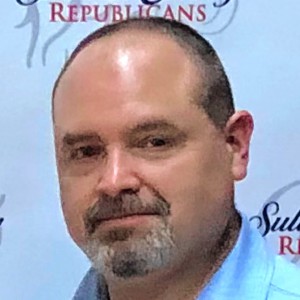 Claremont removes former police officer accused of threats from city committees
Claremont removes former police officer accused of threats from city committees
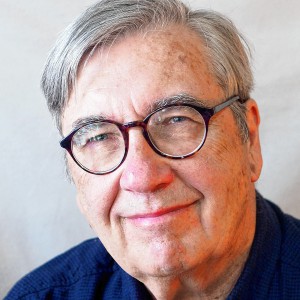 Over Easy: ‘A breakfast without a newspaper is a horse without a saddle’
Over Easy: ‘A breakfast without a newspaper is a horse without a saddle’
Dr. Richard Carmona, a Vietnam veteran who served as surgeon general under President George W. Bush, spoke of his son’s experience with post-traumatic stress disorder and the challenges he encountered in accessing treatment. Because his son, who served in Iraq, was still on active duty, he was initially denied care by the Department of Veterans Affairs.
Carmona was able to make some calls and get him in, but he said, he wondered: “What happens if that soldier’s father is not the surgeon general?”
His son still struggles with PTSD. Simply driving on a rural road can trigger flashbacks to his time in Iraq and leave him shaking and searching for improvised explosive devices.
“It’s personal to me; I see it everyday,” Carmona said of mental health. “... That’s why I’m so passionate about it.”
While Thursday’s event focused on mental health in personal terms, the conversation also took a political turn.
Carmona said the most immediate priority to address the nation’s mental health crisis is to “make sure we preserve our democracy because it’s being tested.”
The role of surgeon general is to serve as a voice of science, Carmona said.
“We have to be the truth tellers,” he said, “telling inconvenient truths to politicians.”
Others shared a similar sentiment and expressed concerns about the divisiveness in the nation as another presidential election approaches.
Dr. Sanjay Gupta, the event’s moderator, a neurosurgeon and chief medical correspondent for CNN, asked a question from a Dartmouth student about how to best navigate the challenges that the upcoming “volatile election season” pose to some people’s mental health. He directed it at Jerome Adams, who served as surgeon general under President Donald Trump, saying “maybe you’re somewhat uniquely qualified to answer this question.”
In response, Adams encouraged young people to travel as much as they can to expose themselves to different views. He said he’s lived in Boston and in Texas, and while the two states have generally different views on issues such as guns, women’s health and drugs, “everyone truly does just want to do the right thing to support their family.”
To improve mental health treatment, Dr. Antonia Novello, who served as surgeon general in the George H. W. Bush administration, said part of the solution is building up primary care and integrating behavioral health care into that setting.
“That is the detective of medicine,” Novello said. It’s a primary care doctor who “knows my name, holds my hand, cares about my family. I want to see more primary care physicians.”
That view was also shared by Dr. David Satcher, who served as surgeon general in the Clinton administration. He was unable to attend in person but shared a recorded video statement. In 1999, Satcher issued a mental health report, which emphasized the connection between mental and physical health and sought to integrate the systems of care.
“Primary care providers must remember they are not alone,” Satcher said in the recording. They should be the “quarterback of the health care team,” directing a patient’s care and working with other caregivers, including mental health professionals, to provide it.
Integrating behavioral health care into primary care would “bring the body and the brain back together,” said Dr. Regina Benjamin, who served in the Obama administration. That, in turn, would help free up beds for inpatient mental health treatment, she said.
If all clinics had mental health workers, that would be a way to “at least start to address this problem,” she said, adding that digital solutions such as telehealth might also help increase access to care.
Murthy spoke about the need to address loneliness as a contributor to both mental and physical illnesses, from depression to cardiovascular disease and dementia. He pointed to cultural and technological shifts such as social media and online ordering as ways humans have developed to “fundamentally change our relationship with each other.”
To address those changes, decrease rates of violence and decrease polarization, Murthy said, “rebuilding social connection (…) has to be a national priority.”
Beilock concluded the event by giving each of the surgeons general and Lisa McBride, the Geisel School of Medicine dean of diversity, equity and inclusion who organized the gathering, a C. Everett Koop legacy medal in honor of the late surgeon general for whom an institute at Dartmouth is named.
Nora Doyle-Burr can be reached at ndoyleburr@vnews.com or 603-727-3213.

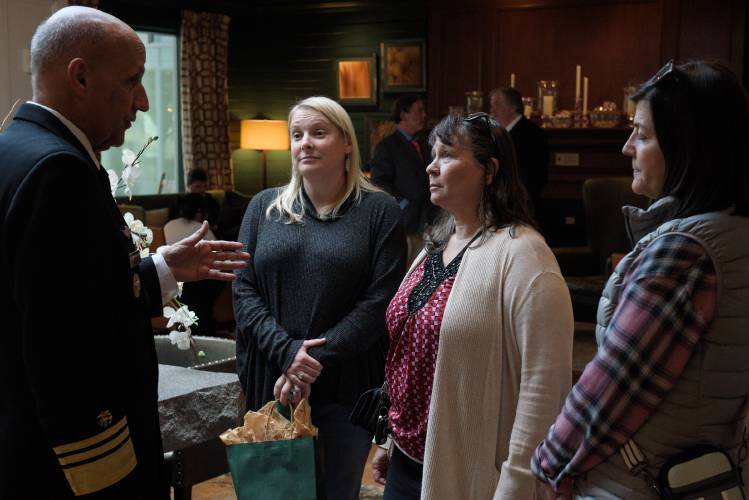
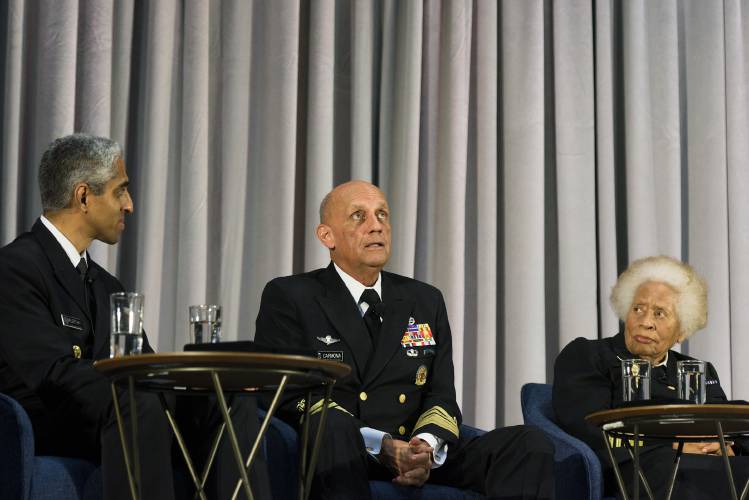
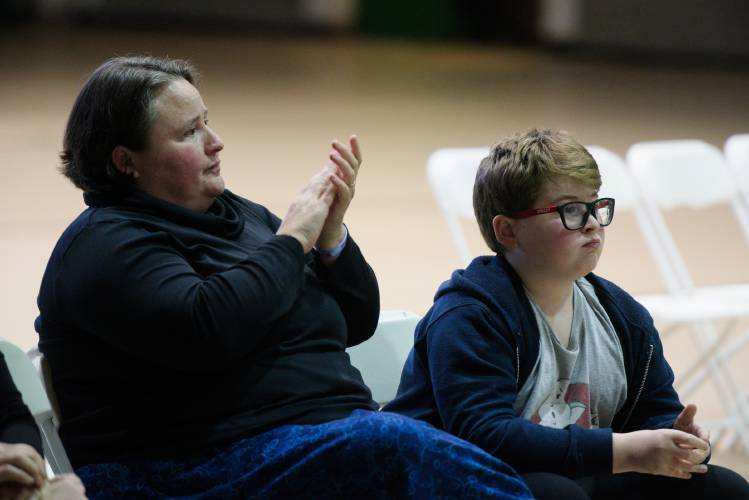
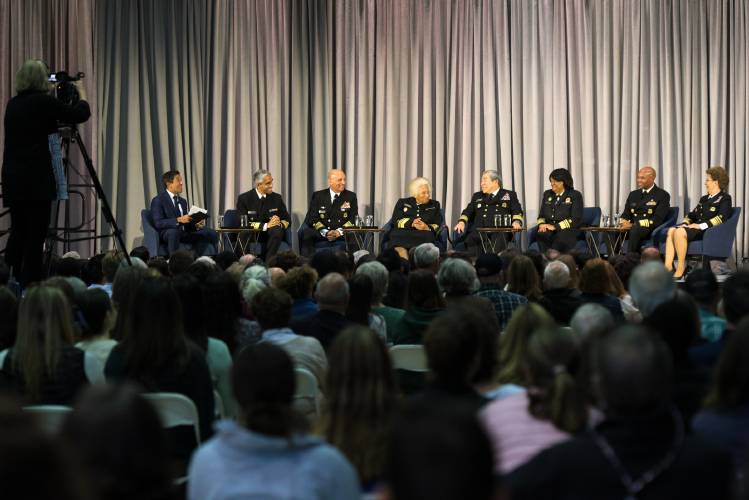
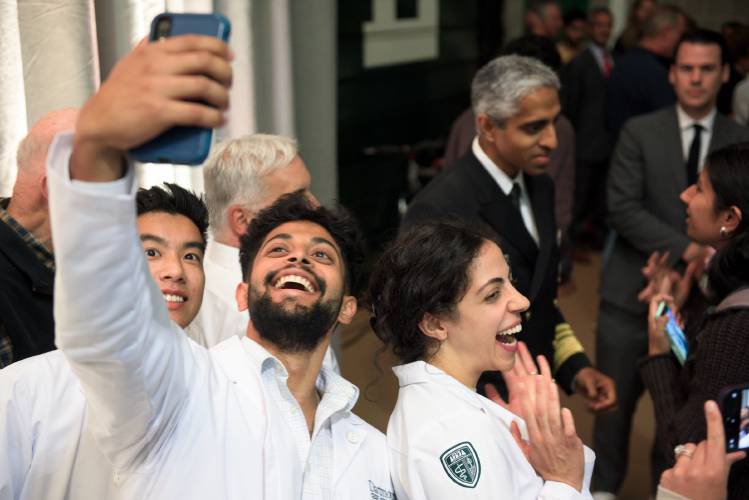
 A Life: Richard Fabrizio ‘was not getting rich but was doing something that made him happy’
A Life: Richard Fabrizio ‘was not getting rich but was doing something that made him happy’
